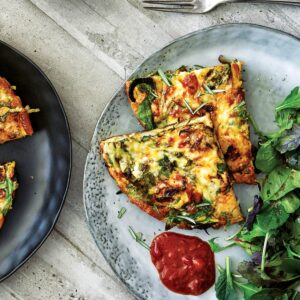
Our advice for a healthy, happy New Year!
At this time of year I tend to read a lot of ‘food and health trends for 2020’ type articles. One trend that never seems to go away is the concept of ‘superfoods’. It’s something we here at Healthy Food Guide don’t buy into 100%.
Superfoods, according to the many articles you’ll find on the subject if you Google, are foods jam-packed with nutritional goodness and incredible health benefits. Depending on what you read, superfoods are said to protect against cancer and heart disease, lower cholesterol, encourage weight loss, reverse diabetes, improve digestive health and even help us live longer. The implication is that they are somehow ‘better’ than the regular old foods we might be eating day to day.
Superfoods you may have heard of include goji berries, acai, chia seeds, pomegranates, turmeric and coconut oil. More basic foods often get a mention, too; broccoli is a perennial favourite, along with green tea, red wine and chocolate, although the last two are often the subjects of frustratingly conflicting reports about their benefits or otherwise. Chocolate and wine are both regularly reported as healthy and unhealthy. It’s no wonder we are confused about what to eat. The idea of a miracle food to potentially counteract anything bad we might be eating has a lot of appeal.
If only living a long, disease-free, healthy life were as simple as consuming a daily red wine, chocolate and pomegranate smoothie, or a handful of chia seeds with a green tea chaser. Unfortunately, as in many areas of nutrition, the truth is a lot less headline-grabbing. While there’s nothing wrong with many of the so-called superfoods – many of them do have wonderful healthy properties – I’m firmly of the belief that there is really no such thing as a superfood. No one thing you eat is going to transform your health and make you glow, or reverse disease, or prevent cancer. It’s especially not going to undo the damage you might be doing to your body if the rest of your diet is below average. There are no superfoods, only super diets, and that’s what we’re all about at Healthy Food Guide.
So what’s a super diet? It’s that most tricky of things – balanced. Nothing’s banned (no, not carbs, or grains, or dairy), and nothing’s eaten in excess except for colourful, non-starchy veges, which we probably could all use more of no matter how much we eat now. That includes ‘super’ broccoli, which is the subject of much interesting research and may turn out to have heart health benefits once the studies are in. But don’t just eat broccoli; get as wide a range of veges in as you can. A Mediterranean-style diet is probably not a bad way to go; this includes a fair amount of fish, olive oil, lots of fruit and veges and contrary to belief, not too much wine.
In my personal super diet I add in a little wee bit of some things that make me happy: cheese, chocolate and champagne, knowing they’re not superfoods but they are going to put a smile on my face. Which in the end is what food should do, in every sense: make you feel good.
www.healthyfood.com











